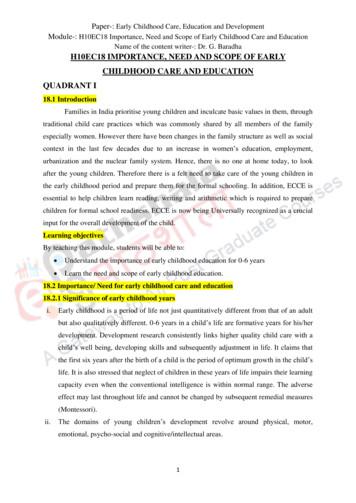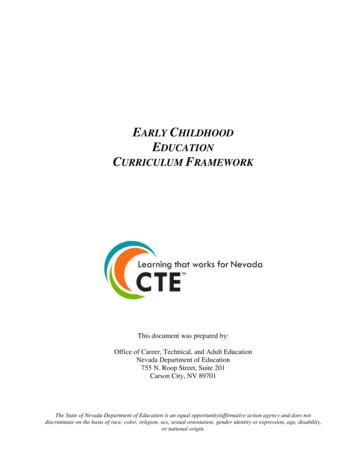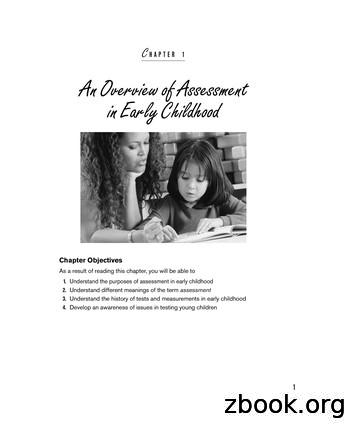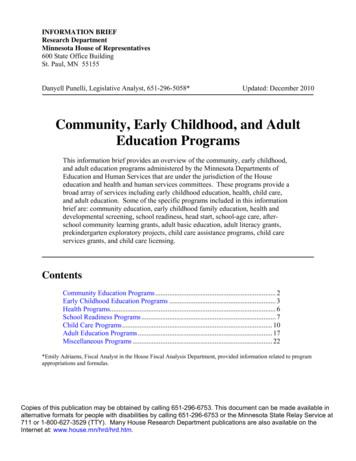PRE-SCHOOL FACILITATOR (Early Childhood Development)
Tel: 2715 491 8225Fax: 2786 546 5520Email: E-SCHOOL FACILITATOR (Early childhood development)- (National Diploma in Early Childhood Development (SAQA ID: 23118 –Level 5)This course is aimed at people who wish to plan and implement a learningprogramme which is based on their knowledge of child development from birth tonine years and which helps children in a specific phase work towards achieving thelearning outcomes of the national school curriculum (where appropriate).How long will it take to complete the course?2 yearsWhat do you need to be able to register?Grade 12 with 3 years’ experience in pre-school environment or National Certificatein Early Childhood Development NQF level 4Type of learning: Distance learning. ECD support sessions to be held every quarter in Polokwane, Pretoria,Johannesburg, Durban and Cape TownCourse outcomes:The ECD Diploma Level 5 is designed to provide access to higher education formany experienced and skilled ECD practitioners and trainers who do not haverecognised qualifications. The purpose of this qualification is to: Develop ECD ETD practitioners (e.g. home-based, centre and school-basedpractitioners including Grade R, family and community ECD motivators,fieldworkers, facilitators, trainers and managers) to provide appropriateeducation, training and development services in the ECD subfield.This qualification provides the opportunity for Practitioners with a Level 4 certificate or equivalent in ECD to further theirprofessional development in ECD by providing access to higher education andtraining qualifications and/ or to specialise in aspects of ECD practice (e.g.Grade R) or specific roles (e.g. managers, trainers etc.) Practitioners with a Primary Teachers certificate (PTC), Primary TeachersDiploma (PTD), or and equivalent of 120 credits to obtain an ECD certificate,either in the preschool phase and/or specialising in reception year teaching.
Practical component:Throughout the course, it is compulsory that you perform the practical tasks withinan ECD Centre/Pre SchoolAssessment:Assessment of your competency is based on the evidence you will submit in aPortfolio of Evidence (PoE) as well as a practical observation towards the end ofyour training.Your PoE will include theoretical tasks and evidence of the practical tasks done atan ECD Centre/Pre-primary School. It is therefore important that you know andunderstand that you must identify and arrange access to an ECD Centre or Preprimary School at the start of your studies, in order to complete the practical tasksrequired, without which you will not be able to complete your studies.FeesR19 610 (once-off payment) – VAT includedR20 620 (installments) – VAT includedIncludes a tablet preloaded with all your course material or printed learning material.PROGRAMME LAYOUTMODULE 1DEVELOP & MANAGE THE ECD PRO GRAMME (13855 )
Work with colleagues, family and community systems in a joint effort to developeach child s full potential through building upon the child s socio-culturalbackground and experience (relates to anti-bias strategies);Plan and implement a learning programme that facilitates the learning anddevelopment of each child according to his/her individual needs, interests, styleand pace of learning (includes children with special needs) within the nationalschool curriculum;Select and use appropriate methods and procedures for assessing children sprogress on a systematic basis, and establish a regular process forcommunicating with family members about their children,Set up and maintain appropriate administrative systems efficiently;Analyse the context of ECD provision in South Africa in all its facets;Advocate for children and promote community recognition of the rights ofwomen and children, and community involvement in providing better qualityECD services;Understand and demonstrate professional accountability in practice.ORGANISE A PROGRAMME OF LEARNING (10288) Motivate for, plan and organise a well-structured programme of learning eventsand activities;Identify the human, material and information resources to be required; andCalculate and monitor costs of a programme of learning.APPLY WORKPLACE COMM UNICATI ON SKILLS (8647) Produce and respond to accessible written and oral communication in theworkplace.DEVELOP & APPLY ACAD EMIC LITERACY SKILLS (14582) Learn more effectively, by using skills to deal successfully with the demands ofacademic contexts and assignments.MODULE 2FACILITAT E A PROGRAM ME OF LEARNING (1028 9) Facilitate a well-structured and varied programme of learning,Implement the principles of CAPS,Use a range of teaching methods and techniques andEncourage learners to participate actively and confidently in the learningprocess.
MEDIATE ACT IVE L EARN ING IN EC D (13853) Explain and apply consistent theories of child development within the nationalcurriculum framework;Systematically observe the development of individual learners to inform ownpractice and planning on an individual basis.MODULE 3FACILITAT E LIF E SKIL LS IN RECEPTION YEAR (7408) Plan a developmentally appropriate life skills learning programme to helpchildren achieve the specific outcomes of the national curriculum for theReception Year;Use a range of educational skills to facilitate the acquisition of life skills andempower the learners;Select activities and resources that are appropriate to the developmental needs,interests, culture, languages, gender and religion of the children;Plan individualised learning experiences to support and challenge each childbased on continuous observation and assessment;Evaluate the effectiveness of the life skills learning programme to improveimplementation.FACILITAT E LI TERACY IN RECEPTI ON (7409) Plan a developmentally appropriate literacy learning programme to help childrenachieve the specific outcomes of the national curriculum for the Reception Year;Use a range of educational skills to facilitate the acquisition of literacy andempower the learners;Select activities and resources that are culture-fair and appropriate to thedevelopmental needs, interests and languages of the children;Plan individualised learning experiences to support and challenge each childbased on continuous observation and assessment;Evaluate the effectiveness of the literacy learning programme to improveimplementation.FACILITAT E NUMERACY IN RECEP TION (7410) Plan a developmentally appropriate numeracy learning programme to helpchildren achieve the specific outcomes of the national curriculum for theReception Year;Use a range of educational skills to facilitate the development of mathematicalconcepts and numeracy skills and empower the learners;
Select activities and resources that are culture-fair and appropriate to thedevelopmental needs, interests, and languages of the children;Plan individualised learning experiences to support and challenge each childbased on continuous observation and assessment;Evaluate the effectiveness of the numeracy learning programme to improveimplementation.PLAN & CONDUCT ASSES SMENT (7978) Plan and prepare for assessmentPrepare candidates for assessmentConduct assessmentEvaluate and record evidence and make assessment judgementsProvide feedback to relevant partiesReview assessmentPROMOTE HEALTHY DEVE LOPMENT IN ECD (1385 4) Prepare a detailed and comprehensive health and safety policies adapted to thespecific setting and age group based on a thorough understanding of the healthand safety needs of children from 0 - 9 years in different settings,Plan and implement developmentally-appropriate activities that help childrenunderstand and explore health and safety issues;Establish partnerships with families, community members and otherorganisations to promote the safety and healthy development of children,including those with special needs;Identify the implications for practice of relevant theories and research findingsrelating to children s learning and healthy development,Plan and provide specific activities and use appropriate strategies to support thelearning and development of children with special needs;Plan and implement a range of strategies for facilitating the social andemotional development of children according to their individual needs.IDENTIFY & RESPOND T O L EARNERS WITH SPEC IAL NEEDS ANDBARRIERS TO LEARNING (10294) Identify learners who have special learning, counselling or health needs, referthese learners to relevant services and take appropriate action within thelearning situation.Identify barriers to learning and take appropriate action within or outside of thelearning situation, which includes dealing with problems of absenteeism anddropout.
MODULE 4FACILITAT E AN INCLUS IV E ED UCA TIONAL ENVI R ONMENT IN ECD(13856 ) Examine and challenge attitudes, biases and behaviours that create andmaintain barriers to learning and development;Critically explain the nature, causes and effects of significant barriers tolearning and development in the ECD programme and community,Create and maintain supportive networks with family, service providers andcommunity organisations working with children experiencing barriers to learningand development;Develop effective strategies to address barriers to learning and development indifferent ECD settings through a process of reflective practice.MANAGE DIVERSITY IN ECD (12842) Interact with colleagues in ways that are fair and non-discriminatory,Critically analyse, evaluate and discuss their own practice at all levels within theworkplace,Implement anti-bias practice and inclusiveness relating to race, class, ethnicity,language, culture, gender, religion, age and ability;Use a range of culture-fair facilitative and mediation skills providing leadershipthat role models fair and non-discriminatory practices.Reflect upon and relate theory to practice.MANAGE A MEDIUM -SCALE ECD SERVICE (7 407) Analyse child, family and community needs and plan an effective service tomeet specific needs within a transformative framework;Manage the service effectively with limited external assistance or supervision;Provide leadership that motivates staff to maintain high standards in their work;Assess resource needs and plan ahead financially to meet needs;Set up and maintain efficient administrative systems appropriate to the needsof the service.Award:Upon successful completion of your studies, you will receive the NATIONALDIPLOMA: EARLY CHILDHOOD DEVELOPMENT (SAQA US 23118 NQF LEVEL 5)which is awarded by the ETDP SETA.
ACCREDITATION:The ETDP SETA granted CAL (Compass Academy of Learning) full accreditation forthe National Diploma: Early Childhood Development NQF 5 SAQAS ID 23118. Yourlearner details are uploaded to the ETDP SETA database upon enrolment. An ETDPSETA verification site visit concludes and confirms your successful achievement ofthe unit standards linked to the qualification. This achievement record will then beuploaded to the NLRD (National Learner Record Database) via the ETDP database.
in Early Childhood Development NQF level 4 Type of learning: Distance learning. ECD support sessions to be held every quarter in Polokwane, Pretoria, Johannesburg, Durban and Cape Town Course outcomes: The ECD Diploma Level 5 is designed to provide access to higher education for
Understand the importance of early childhood education for 0-6 years Learn the need and scope of early childhood education. 18.2 Importance/ Need for early childhood care and education 18.2.1 Significance of early childhood years i. Early childhood is a period of life not just quantitatively different from that of an adult
T.E.A.C.H. Early Childhoodâ PENNSYLVANIA Certification Only Scholarship What is the Purpose of the T.E.A.C.H. Early Childhood Certification Only Scholarship? The purpose of the T.E.A.C.H. Early Childhood Certification Only Scholarship is to assist early childhood teachers in obtaining their PA Early Childhood Education (PreK-4) teaching certificate.
Early Childhood Care Education - Early Childhood Care Education (ECCE) Centres in this Policy will be referred to as pre-school or Kindergarten. At present in Vanuatu Early Childhood Care & Education [ECCE] is synonymous with Pre-School [4 - 6 year olds]. However, internationally the term ECC
Early Childhood Education I L1 Early Childhood Education II L2 Early Childhood Education III L3C Early Childhood Education Advanced Studies AS The core course sequencing with the complementary courses provided in the following table serves as a guide to schools for their programs of study.
CHAPTER 1 An Overview of Assessment in Early Childhood Understanding Assessment in Infancy and Early Childhood Not too long ago, resources on early childhood assessment were limited to occa-sional articles in journals, chapters in textbooks on teaching in early childhood pro-grams, and a few small textbooks that were used as secondary texts in .
ECE 240 - Administration of Early Childhood Care and Education Programs (3) ECE 241 - Administration: Human Relations for Early Childhood Education (3) Colorado Mesa University B.A. Early Childhood Education - Early Childhood Special Education Advisor: Vail Shoultz-McCole vshoultz@coloradomesa.edu 970-255-2674
Early Childhood Care, Development and Education (ECCDE) is a term that is used interchangeably worldwide but refers to the same concept of early childhood education and cognitive development. The World Bank for instance refers to it as Early Childhood Care and Education, whereas UNESCO refers to it as Early Childhood Development Care.
streams for early childhood and child care programs, making recommendations on how to coordinate and collocate early childhood and child care programs in one State Office of Early Learning, and reviewing program evaluations regarding high-quality early childhood programs. (Minn. Stat. § 124D.141)























